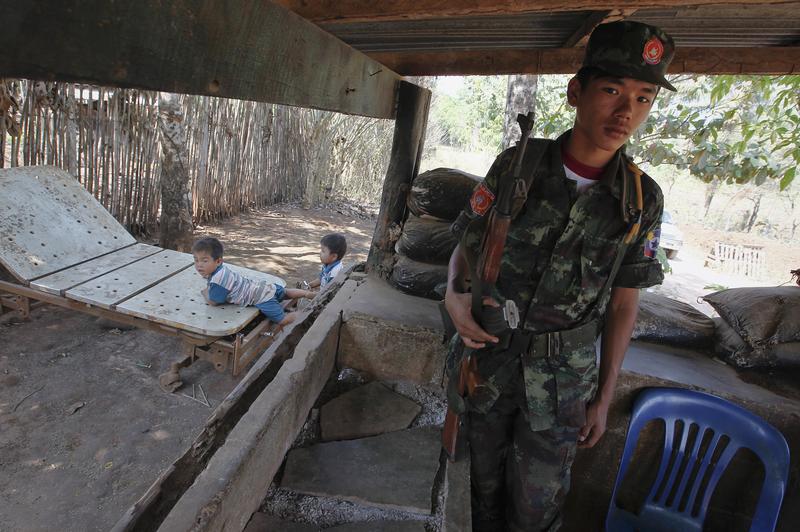Mon political parties, monks and members of civil society in the southeastern state are urging the New Mon State Party (NMSP), a Mon ethnic armed group, to sign Burma’s Nationwide Ceasefire Agreement (NCA).
“At first, it was about signing together with the members of the Northern Alliance such as the KIA [Kachin Independence Army], MNDAA [Myanmar National Democratic Alliance Army] and TNLA [Ta’ang National Liberation Army] — as all-inclusive,” said Mon National Party Central Executive Committee member Nai San Hlaing, who attended a meeting on Wednesday in Moulmein involving representatives from the NMSP, political parties and civil society organisations.
“However, the [Burma Army] commander-in-chief doesn’t accept them [members of the Northern Alliance] … and it cannot be all inclusive. Because the New Mon State Party is a comparatively small organisation, it is advised to sign the NCA. After signing the NCA, the NMSP should get the old [military] posts taken by the government army and other rights. Most of the attendees at the meeting told the NMSP to sign the NCA.”
An abbot, Wara Wontha, similarly said signing the NCA was the next step on the path to a sustainable peace.
“The NCA should be signed. If not, peace will not be achieved,” he said. “This is not a time to solve the problem through arms; [ethnic armed groups] should discuss at the table. If the NCA is not signed and armed groups are fighting, the people will be the victims. So, there is no way other than signing the NCA.”
Attempts by DVB to contact the NMSP spokesperson to discuss the armed group’s thinking on the issue were unsuccessful.
The NMSP is a member of the United Nationalities Federal Council (UNFC), a coalition of seven ethnic armed organisations that have not yet signed the NCA. Eight non-state armed groups signed onto the accord in October 2015 under the previous government led by then-President Thein Sein.
Whether to accede to the accord remains a contentious question among and within ethnic armed groups. For those against signing, one of the primary concerns has been inclusivity, with the previous government shutting a handful of ethnic armed groups out of the process, including the TNLA and the MNDAA.
Both are members of the Northern Alliance, which has clashed with the Burma Army intermittently since the alliance launched a coordinated assault on police and military outposts on 20 November in northern Shan State. That fighting, along with an MNDAA attack on the Kokang region’s administrative capital Laogai earlier this month, have left prospects for an inclusive peace process dim, at least in the short term.
[related]
By signing the NCA, the NMSP would be allowed to attend the upcoming 21st-Century Panglong Peace Conference as a full participant. The status of NCA non-signatories at the conference, or whether they will be invited at all, remain uncertain. The 21st-Century Panglong Peace Conference was due to convene at the end of February, but that deadline was missed and no summit now looks likely until at least May.
The delay has fuelled concerns that Burma’s peace process is foundering, as did a declaration by several ethnic armed groups, led by the country’s largest, disavowing the NCA and seeking alternative channels for dialogue.
The powerful United Wa State Army, an NCA non-signatory, was at the forefront of the declaration, which came following a meeting of seven non-signatory ethnic armed groups in late February.



